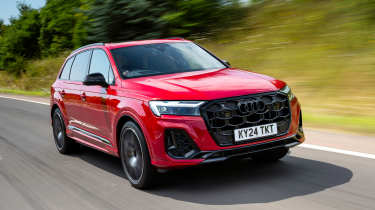Audi drops 500bhp petrol V8 into SQ7 and SQ8, ditching diesel V8
Audi’s S models shuffled again as new 500bhp petrol V8 powers previously diesel-only performance SUVs
Audi has announced it will replace the twin-turbocharged mild-hybrid V8 diesel engine in the SQ7 and SQ8 with a new 500bhp twin-turbo petrol V8, marking the death of the Volkswagen Group’s V8 diesel engine. If this sounds out of sync with Audi’s other high-powered diesel S models you’d be right, but with the engine having already been removed from its application in Porsche and Bentley models, it’s an insight into the shifting SUV market at the top end.
The 4-litre bi-turbo V8 engine has a familiar construction to other V8s within the group, with a 90-degree V angle in which both twin-scroll turbos nestle. Audi’s applied a whole catalogue of fuel-saving measures to minimise the hike in expected fuel use, including cylinder deactivation and the same mild-hybrid system as before, but this time without the previous diesel’s electrically driven supercharger.
Power is rated for both models at 500bhp, which represents a 71bhp rise compared to the previous diesel, but torque is down from 664lb ft (which was generated at a crazy 1000rpm) to 568lb ft. Given the nature of the power versus torque equation though, both new models are quicker on paper, with both the SQ7 and SQ8 hitting 62mph in 4.1sec, 0.7sec faster than before. Top speed is capped at the usual 155mph for both.
It’s not just the power figure that will be bigger than before on these new petrol models though, with fuel consumption doubtlessly higher compared to that of the unstressed diesel that came before. Curiously, this is a figure that Audi has yet to release, but for context the previous diesel would consistently float in the high 20s mpg-wise, a figure the new petrol engine will struggle to match.
The rest of the package is mostly unchanged, with power being sent to all four wheels via an eight-speed torque-converter automatic transmission. Standard across all specifications is an electromechanical rear-wheel steering system, adaptive air suspension and 400mm front brake discs with six-piston caliper brake package, but you’ll have to plump for the Vorsprung trim on both models to get the electromechanical roll mitigation system and a torque vectoring Sports rear differential. Vorsprung models also gain 22-inch wheels and tyres, up from 21-inch on standard versions.
Despite the dim view of diesels in 2020, when considered in context the previous SQ7 and SQ8 diesels always felt like a good compromise of everyday punch with reasonable running costs. They were also two of the few large-capacity diesel models still on sale, giving them a key point of difference against petrol rivals from Porsche, BMW and Mercedes-AMG. This is a key distinction these models no longer have.
Both the SQ7 and SQ8 will be available in the UK from this autumn priced from £78,000 and £83,000 respectively, which is a fairly comprehensive £4000 rise over the cost of the previous diesel models. The SQ8 is a particularly interesting case, with just £18k separating it from the also-petrol 592bhp twin-turbo V8 RSQ8 that tops the range.




